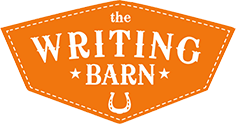As you know, we at The Writing Barn are all about making time for your writing in a wonderful, calming, creative space. That’s why, we’re offering a 20% discount for a September weekend booking. Up to four can sleep in the Writing Barn, and another seven in the Cabin on the property. And it’s easy to book, just email info@thewritingbarn.com.

Early this month, we celebrated writing retreats with a guest post by the awesome author P.J. Hoover (the upcoming SOLSTICE), talking about the ins and outs of organizing a successful retreat. This week, we have a guest post from the also awesome author Lynne Kelly (CHAINED), explaining what she does when planning a retreat for herself and her writing friends.
Take it away, Lynne…
Those Austin folks are really lucky to have The Writing Barn, and this year at the Austin SCBWI conference, I was lucky enough to win a weekend Writing Barn retreat. My Will Write For Cake critque buddies cheered right along with me when my name was announced, because they knew I’d bring them along.
Our weekend at the Barn this summer was such a success, we’d like to make it an annual event. (Let’s be honest, we’d like to make it a weekly event, but our families may not go for that.) If you decide to plan your own getaway, here are some tips for having a productive retreat:
1. Plenty of beverages. Writing is thirsty work.
2. Dinner at a good Mexican restaurant (with more drinks)
3. Plenty of food so you don’t have to cook and there’s always a snack within reach. The York Pieces were a favorite.
4. Critique partners who write helpful notes on your notebook of brilliant writing.
5. …and who inspire you to make e-cards quoting their wisdom.
Wait a minute.
That’s how to have a fun writing retreat. Which is great, but maybe you also want a productive writing retreat. We did manage to get some writing done while we were there, so here are some ideas for making that happen:
1. Writing-only times
It’s not often we’re around other writers, so when we are, it’s tempting to chat incessantly about books and writing. No one else knows what we’re going through or loves books as much as we do. But if we don’t have times designated for writing, we wouldn’t get anything else done. Set some working times, and use breaks and meal times to chat about your progress, what you’re working on, and what books you’ve read lately. We didn’t use a timer but I think that would’ve helped a lot, so there’d be specific times to stop and talk about what we’d just written.
2. Goal-setting
It also helps to share your goals before the retreat starts. It gives you something to check in on each other about, so instead of something vague like “How’s the writing going?” your friends can ask you, “Did you get your chapter 12 finished?” Anyone who doesn’t make any progress toward her goal will be wearing the figurative Cone of Shame on the way back home. Or maybe a literal cone of shame. Hey, there’s an idea.

3. Flexibility
Although it’s good to have goals, everyone works differently, so if you try to set too many goals for the group or try to write in a way that isn’t natural to you, you might just end up frustrated and burnt out. Stay focused on accomplishing your writing goals, but keep them realistic and tailored to your own style of writing.
Now, get a few writing friends together, make a grocery list, and pick a weekend you can all get away to write together!
Lynne Kelly was a special education teacher for a few years, until she realized it was a job for someone with good planning and organizational skills. But it was during those years she fell in love with children’s literature all over again, so that all worked out. Her article, “The Landscape Unseen,” appeared in the recent issue of Hunger Mountain. She now works as a sign language interpreter in the Houston area and writes novels for children and young adults. CHAINED is her first novel.





